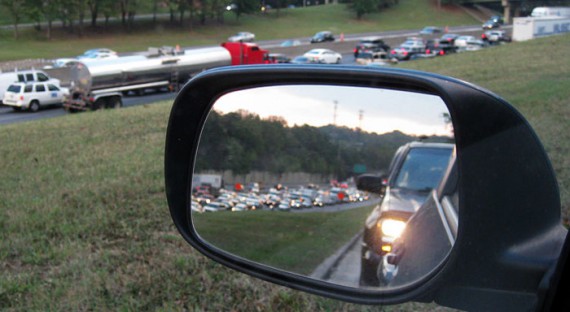
Occasionally I ponder whether or not the US will ever get off oil as its primary source of transportation fuel. In other words, whether we will trade our gas-burning cars for other modes of transportation, like trains and subways for longer distances and walking and cycling for shorter ones. Electric cars are perhaps a more realistic possibility, given the way our current infrastructure grossly favors cars. To switch to electric cars, we wouldn’t need to redesign roads or add rail; we’d just need to convert existing gas stations to electric substations.
I got to thinking about this today thanks to my Twitter friend Ara posting a link to an article about world gas prices, which includes this intriguing paragraph:
The world’s most expensive gas, according to the survey, can be found in Norway, where drivers pay $10.12 for a gallon of premium gas. While the country has significant oil reserves of its own, instead of using the money to subsidize vehicle fuel it goes to fund social spending such as free college education and national infrastructure.
This made me wonder if we could subsidize the shift away from oil by stepping down our subsidization of it. According to a study by the Environmental Law Institute, the US spent approximately $72 billion from 2002 to 2006 subsidizing fossil fuels. Unfortunately, this figure isn’t broken out by type, so we can assume some of this money went to coal as well. If the move was targeted toward reducing oil use, I can’t imagine ending coal subsidies at the same time. Any replacement transportation, whether it be trains or electric cars, would depend on electricity, which in this country is largely generated through burning coal. (Of course, burning coal, another fossil fuel, has many health, environmental, and non-renewable resource issues, and eventually we’ll have to get off coal as well.)
The upshot is, I’m not sure how much money we’d be able to free up for infrastructure change. And then there’s the question of how much that change would cost. Going completely to a rail-based system would be extraordinarily expensive; entire cities would have to be redesigned. Sprawl has spaced everything out so much that it’s rare for someone to be able to walk or cycle to their nearest grocery store, let alone to work. City planners would either have to come up with ways to link neighborhoods to shopping centers or to redistribute commodities along communal travel routes.
It’s hard to imagine how this would play out in rural areas, where people drive ten, 20 or 40 minutes just to get into town. Obviously there wouldn’t be a rail system to those people’s distant houses. In that situation, it doesn’t seem possible to completely replace cars with mass transit. A friend once showed me an overhead view of farming communities in South America in which homes are built around a cul-de-sac and their farms radiate out around them. While this model clusters rural residents together and makes communal transportation more feasible, it would require completely redistributing people’s land, and it would also require a huge cultural shift away from our current farm style of houses planted in the middle of their acreage.
Each city, town, incorporated area, and unincorporated area would have to come up with its own plan to reduce oil consumption. I can’t see this happening on a broad scale without a federal mandate–after all, individual states also subsidize oil–but then there would need to be federal oversight. I expect the same states that oppose national health mandates would oppose national transit mandates, so any such movement would take years just to get started.
Without more information, I can’t say whether or not this sort of thing will ever happen in the US. But I do hope our elected officials are at least thinking about it. I’d love to see us get off oil, for diplomatic as well as environmental reasons.